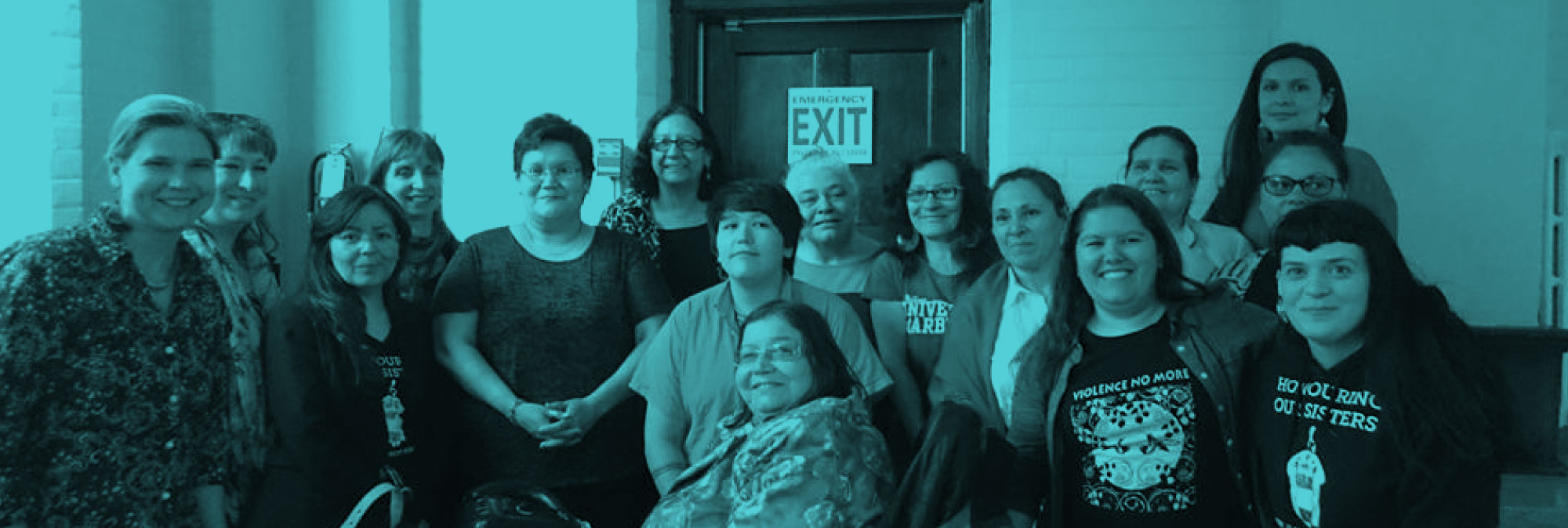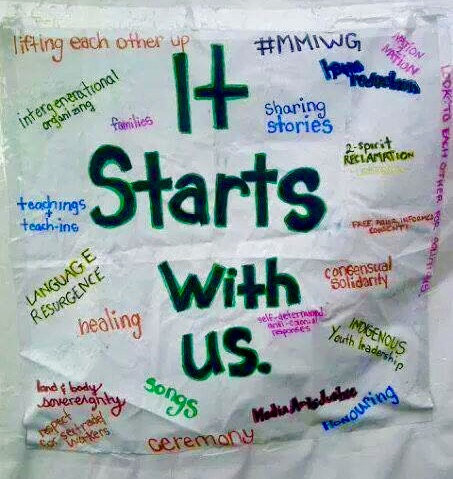We acknowledge the women, families and communities who have been doing this organizing themselves for decades, especially when police and governments have failed to acknowledge, listen or act despite Indigenous women, Two Spirit and Trans people that have continued to disappear or be murdered. Generations of work have brought us to where we are and continue to teach us how we must work forward in achieving justice together.
Sisters in Spirit was the first government-funded database of cases of missing and murdered Indigenous women in Canada started in 2006. Canada’s federal government stopped funding the program in 2010. Critics of the cut say it was meant to silence the Native Women’s Association of Canada, the group behind the database. The final report released by NWAC made clear connections between violence and landlessness, colonial child welfare policies, and poverty resulting from exploitation of resources and bodies.
Before the Native Women’s Association of Canada discontinued the work on their database in 2010 it had reported close to 600 indigenous women and girls gone missing or murdered in the country over the preceding 30 years.
Since 2010, many more have vanished or been killed and according to the founder of Families of Sisters In Spirit, Bridget Tolley their names and stories were not being recorded in a central location that was accessible to communities. Families of Sisters in Spirit was created in January 2011 in response to cuts and as a means to continue the work of supporting families through honouring sisters in spirit through public awareness and advocacy. FSIS carries forward the legacy of drawing crucial connections between targeted violence against Indigenous women and girls and Canada’s violent colonial past and present. FSIS differs from SIS insofar as FSIS is fully autonomous, all-volunteer, accepts no government funding, and is accountable first and foremost to families and communities impacted by state and interpersonal forms of violence. FSIS places emphasis on carving out (safer) spaces for family members and communities to share their stories and transformative strategies without fear of reprisals such as loss of jobs or funding cuts. This allows FSIS considerable power to take direct action alongside families of the murdered and missing and to build long-term, mutually uplifting relationships with other Indigenous community-led campaigns and initiatives–on our own terms.
No More Silence has been gathering names of missing and murdered Indigenous women since it was founded in 2004. Co-founder, Audrey Huntley, conducted the Traces of Missing Women research road trip for CBC television and interviewed 45 family members from Ontario to Northern BC in the summer of 2004. In 2005 her documentary Go Home Baby Girl aired on national television. Then when Robert Pickton’s trial began in Vancouver in 2006, No More Silence began holding ceremony to honour missing and murdered Indigenous women in an act of public mourning on February 14th in solidarity with Vancouver’s downtown eastside where the Women’s Memorial March has been held for over 20 years on that date. No More Silence borrowed the tradition of printing the names of women killed or missing in the community to hand out during the ceremony. It is this list now inclusive of 70 names shared by community/family members or identified in media coverage of women murdered or missing in Ontario that constitutes the content of the database so far. Some of these names were shared with the group by Amber O’Hara when she joined No More Silence for a brief period in 2007. Amber had already been conducting research into missing and murdered Indigenous women in Canada in the 90s and created the MissingNativeWomen.ca website that she kept updated until she passed away in 2011. Some 300 stories were documented by Amber.
No More Silence and volunteers worked with the data generously made public by Maryanne Pearce. Her dissertation, an Awkward Silence: Missing and Murdered Vulnerable Women and the Canadian Justice System identified 846 Indigenous women murdered or missing in the last 30 years.
The RCMP initially cast doubt on the Native Women’s Association total, saying that of the 118 names shared with the RCMP’s National Aboriginal Policing Services, only 64 of them could be confirmed in a police database the RCMP spokesperson also said there are concerns over the 500 possible victims recorded in the association’s database. On May 16 of 2014, the RCMP released a 22-page “national operational overview” on missing and murdered Aboriginal women. The report cites “new” statistics showing the total number of cases and how disproportionate they are to cases involving non-Aboriginal victims.
This report confirmed what many advocates already knew, that the number by now was likely a lot higher, and the RCMP report confirms this. The distressing number of cases they have confirmed since 1980: 1,182. It is important to note the RCMP also utilized data from the Sisters in Spirit Database as well as the work of Maryanne Pearce who shared her information with them. Not surprisingly, the RCMP’s latest report makes no mention of colonialism, colonization nor residential schools, and places responsibility back onto Indigenous women for their own deaths and disappearances.
In 2006 specific community work was also being conducted in Northern BC after a number of disappearances along Highway 16 – named the Highway of Tears. The Native Youth Sexual Health Network teamed up with the Highway of Tears Initiative which is dedicated to seeking justice for the families and communities of missing and murdered women and children who have gone missing from Highway 16 located in northwestern British Columbia.
For 2 years they traveled to numerous areas across this region working with youth, Elders, families, and communities. As a result, the documentary “Building a Highway of Hope” was created. The film came about after a 2006 symposium was held in response to the communities demands for action in response to the numerous deaths connected to this aptly named section of Highway 16 yielded 33 recommendations that address the need for physical human services.
In a shift away from data collection to preventative action and more support for families, No More Silence collaborated with Aboriginal Legal Services to create a video and web resource entitled: Not Just Another Case: When Your Loved One Has Gone Missing or Been Murdered. The complete tool is housed here https://aboriginallegal.ca/resources/missing-persons-resource-video
The Native Youth Sexual Health Network has been working for over 10 years to support Indigenous youth leadership across Canada and the U.S in addressing issues of sexual and reproductive health, rights and justice. NYSHN supports Indigenous youth responses and community based responses to colonial gender-based violence from addressing the criminalization of HIV, environmental violence on our bodies and lands, decreasing stigma and shame, creating media arts justice, supporting Indigenous peoples in the sex trade, sex industry and street economies and reclaiming sexuality on our own terms. They are also a community partner on Walking With Our Sisters, a commemorative art installation to remember and honour missing and murdered Indigenous women.







